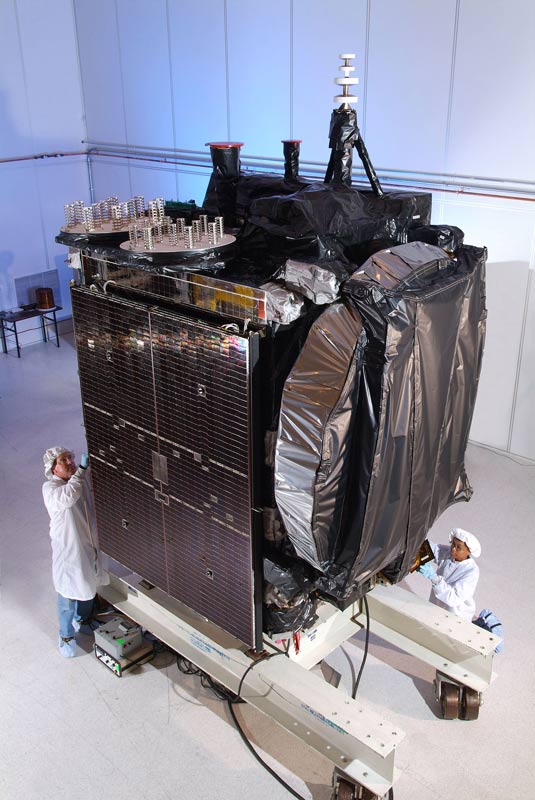'Zombie' Satellite Comes Back to Life

A "zombie satellite" that spent months sending out signals while it was adrift in orbit has sprung back to life, resetting itself after its unexplained breakdown in space earlier this year.
"The most critical phases of Galaxy 15’s recovery have been successfully completed," officials at Intelsat, the communications provider that owns the satellite, said of the newly responsive satellite.
The Galaxy 15 communications satellite lost contact with its flight control center in April. But in an unexpected twist, the stricken satellite's telecommunications broadcast package remained in operation. With Intelsat operators unable to control the solar-powered satellite, Galaxy 15 continued to transmit signals, posing a risk of interfering with the signals of neighboring satellites. [Worst Space Debris Moments in History]
In the months that followed, Intelsat worked closely with the operators of other broadcast satellites to ensure that their communications services – which included television broadcasts – would not be affected when Galaxy 15 drifted by.
But that drama in space has ended.
On Dec. 23, the battery on Galaxy 15 — which relied on solar panels pointed at the sun to generate power — became completely drained, Intelsat officials said. Once that happened, the satellite reset itself as designed and began accepting commands from Intelsat's control center.
"We have placed Galaxy 15 in safe mode, and at this time, we are pleased to report it no longer poses any threat of satellite interference to either neighboring satellites or customer services," Intelsat officials announced.
Get the Space.com Newsletter
Breaking space news, the latest updates on rocket launches, skywatching events and more!
The making of a "zombiesat"
Galaxy 15 went rogue April 5, leaving the 4,171-pound (1,892 kg) satellite drifting through the cosmos. Intelsat made several early attempts to shut it down.
The spacecraft's manufacturer, Orbital Sciences Corp. of Virginia, said it suspects an intense solar storm caused the communications malfunction. Intelsat is conducting a technical investigation but has yet to reach any conclusions on the cause of the glitch.
Despite a series of close flybys between Galaxy 15 and neighboring satellites, there was never a risk of a collision with other craft, Intelsat officials have said.
Intelsat worked closely with other service providers to oversee and perform intricate maneuvers to avoid signal interference during the flybys.
A satellite's resurrection?
With Galaxy 15 now accepting commands from Earth, there is a possibility that the satellite could become fully functional again.
"After we complete the initial diagnostic tests on Galaxy 15 and the drift of the satellite stopped, we expect to relocate the satellite to an Intelsat orbital location where we will assess the viability of the payload, and conduct extensive in-orbit testing to determine the functionality of every aspect of the spacecraft," Intelsat officials said.
Galaxy 15 launched on Oct. 13, 2005, on a European Ariane rocket. The satellite was originally designed to operate through 2020, but the spacecraft's potential service life will be reassessed if and when it is recovered.
- Worst Space Debris Moments in History
- Images - Spotting Satellites and Spaceships From Earth
- Life's Little Mysteries: How Much Junk is in Space?
You can follow SPACE.com Staff Writer Denise Chow on Twitter @denisechow.
Join our Space Forums to keep talking space on the latest missions, night sky and more! And if you have a news tip, correction or comment, let us know at: community@space.com.

Denise Chow is a former Space.com staff writer who then worked as assistant managing editor at Live Science before moving to NBC News as a science reporter, where she focuses on general science and climate change. She spent two years with Space.com, writing about rocket launches and covering NASA's final three space shuttle missions, before joining the Live Science team in 2013. A Canadian transplant, Denise has a bachelor's degree from the University of Toronto, and a master's degree in journalism from New York University. At NBC News, Denise covers general science and climate change.









